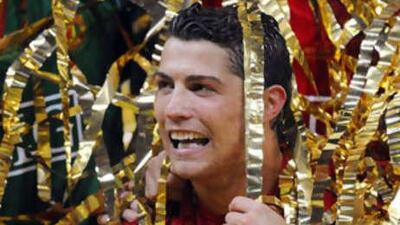LONDON // EVERY businessman knows that some contracts are not worth the paper they are written on. But in the world of European professional football, even the paper seems a bit redundant these days. As the seemingly endless saga of the Cristiano Ronaldo transfer has shown, when a player signs a multi-million, five-year contract with a club (as the 23-year-old Portuguese midfielder did with Manchester United just over a year ago), all he is really doing is committing to stay with the team for the coming season.
For all Sir Alex Ferguson's huffing and puffing about not allowing Ronaldo to head for his "dream" job with Real Madrid and instead keeping him clicking his heels on the touchline, few people inside the sport believe that this is practical and worse might even be illegal within the European Union. On the practical side, Arsene Wenger, the Arsenal manager, says: "OK, you can think: 'I can leave this guy here if he sulks and play him in the reserves'. But it doesn't work. It's a good solution in theory, but on a daily basis it's impossible. What can you do with a player who doesn't want to stay?"
For most clubs, the answer to that is simple - take the money. Very few at Old Trafford want Ronaldo to go, but £70 million (Dh514.5 million) from Real Madrid would help soften the blow, especially as far as the Glazer family - the American owners of United - are concerned. On the legal side, Fifa has its 'Regulations for the Status of and Transfer of Players' - 38 pages of legal mumbo-jumbo that would probably not stand up to a European Court of Justice challenge.
These regulations only allow players under 27 to be tied contractually to a club for three years (although they can do an optional deal for a maximum of two more years, as Ronaldo did). In effect, this means that most players who want out are tied to a team for only two seasons because, if they stay for three, they can move on without the club getting a transfer fee. And as for benching a player or sticking him in the reserves, an employment lawyer says: "The question of how long you can put an employee on 'gardening leave' is not clear, legally.
"Ronaldo could say that his skills will atrophy if he doesn't get to play at the top level, or that he has a right to play, so he could sue. That is a tough point of employment law. At the end of the day, these situations usually result in the player going." If all this were not bad enough for the clubs, you have Sepp Blatter, the Fifa president, popping up and accusing clubs who refuse to sell players of being guilty of "modern slavery".
Little wonder that the indentured Ronaldo, currently recovering in Lisbon from ankle surgery and a broken heart (he recently split up with his long-time girlfriend), agreed with Blatter to howls of derision from the British media. Those slave masters at Old Trafford have him toiling away for a paltry £130,000 (Dh955,603) a week when he has been offered more than twice that in Madrid. But if a player is determined to make a break for freedom, then free he will be, reckons Barry Silkman, a football agent. "It involves grinding the club down with transfer requests and leaks to the press until they buckle," he told The Times recently.
"You would just keep knocking on the door and drive them mad. You tell them you are not happy. You'd get bits in the press. You just have to drive them mad by keeping on knocking on the door and phoning them up. "The agent would phone up the manager and say that his player really didn't want to be at the club any more and the player would keep going to the manager and say he wanted a move. The manager knows that if a player is not happy, you can only do so much to keep him."
So far, Ronaldo and Ferguson do not appear to have been talking, but the player is doing his best to drive the manager mad. Two things are against the Portuguese star, however: time and his ankle injury. It is little more than three weeks before the transfer deadline and, if nothing happens by then, nothing can happen until the window of opportunity opens up again in January. Doctors believe that Ronaldo will not be fit to play until October and, although they are confident that he will make a complete recovery, a £70 million transfer fee for an injured player is a lot to fork out, even for the powers that be at the Estadio Santiago Bernabeu.
There again, if he stays in the Premier League, he is likely to be in for an even rougher ride than normal in the coming season. He has been branded greedy, vain and deluded in the British media in recent days. Sadly, being greedy, vain and deluded seems the stock in trade of not just Ronaldo, but of many in football these days. They are not personality traits, however, historically associated with slaves.
@Email:sports@thenational.ae

